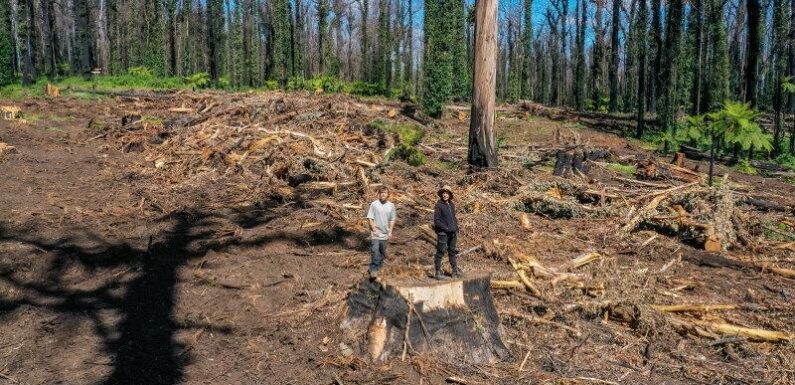
State-owned logging agency VicForests has recorded an unprecedented $52.4-million-dollar financial loss this year, blaming it on the cost of multiple court cases brought against it by community environment groups.
The figure is significantly higher than last financial year’s loss of $4.7 million and the previous year’s loss of $7.5 million.
GECO environmental group members Owen Hanson and Chris Schuringa in a logged coupe near Gongerah, in East Gippsland.Credit:Justin McManus
In its 2021-22 annual report, tabled in parliament on Wednesday, VicForests’ chief executive, Monique Dawson, said the year had been “incredibly challenging” and the agency did not meet its wood supply targets.
Dawson blamed the agency’s shortfall on legal injunctions that halted logging while court proceedings were underway, which made planned harvesting “unviable” or prohibited it altogether.
More than half of the agency’s operations were disrupted due to the court cases, she said.
The direct court costs were $10.4 million, while indirect costs included “stand down” payments to contractors totalling $6.2 million and compensation to customers for failing to supply contracted timber totalling $7.5 million.
Members of Kinglake Friends of the Forest and Environment East Gippsland with their lawyers at the Supreme Court.
VicForests was also forced to carry out additional surveying because of court orders and increased environmental requirements, which led to a “substantial impairment of the value of the timber resources”, Dawson said.
In the past two years, the agency has been the target of about a dozen legal challenges from community environment groups.
In November, Victoria’s Supreme Court found VicForests had failed to follow the law and protect endangered gliders while logging native forests, in a case taken to court by two volunteer-run groups, Kinglake Friends of the Forest and Environment East Gippsland.
Justice Melinda Richards said the agency’s timber-harvesting operations in East Gippsland and the Central Highlands had presented a threat of “serious or irreversible harm” to the gliders. VicForests may appeal the outcome.
Environment East Gippsland spokesperson Jill Redwood likened native forest logging to whaling, saying it was an environmentally destructive practice that should be left in the past.
“The main reason VicForests finds itself in the Supreme Court year after year is because it refuses to log within the laws to protect rare wildlife and our forests values,” said Redwood.
Also in November, another community group, Warburton Environment, won a case against VicForests in which it was determined that the logging agency must survey for and protect a threatened plant species, the tree geebung.
The greater glider, once common across the eastern seaboard, is now endangered.Credit:Josh Bowell.
Federal Environment Minister Tanya Plibersek recently upgraded the listing for greater gliders from vulnerable to endangered because habitat destruction from logging and land clearing for agriculture has turned the large gliding possum into a rarity.
Community groups also took the agency to the Federal Court in 2021, successfully arguing it had breached federal laws when it logged forest coupes in Victoria’s central highlands. This decision was later overturned in VicForests’s favour on appeal.
The deputy leader of the Victorian Greens, Ellen Sandell, said the financial loss should prompt the Victorian government to end native forest logging and replace it with a “forest transition authority”.
“This is yet more proof that logging our native forests is a disaster – it doesn’t just destroy precious habitat, it’s also pouring tens of millions of our taxpayer dollars down the drain, Sandell said.
Federally, political pressure over native forest logging has increased, after Plibersek committed Australia to an international pact to protect 30 per cent of the world’s land and water at the UN’s environment summit in Montreal this month.
Senator David Pocock singled out native forest logging as a key environmental threat that must be addressed if Australia is to hold up its end of the global biodiversity agreement.Credit:Alex Ellinghausen
Key crossbench senators, including David Pocock, say Australia must end the union-backed native logging industry because it is a risk to the survival of endangered species such as koalas, greater gliders and Leadbeater’s possum.
In 2019, Premier Daniel Andrews announced the logging of native forests would be phased out in Victoria over the next decade, with a reduction in the current level of native timber available for logging from 2024-25.
Native forest logging in Victoria produces about 3 million tonnes of carbon emissions each year, equivalent to the pollution from 700,000 medium-sized cars or double the state’s domestic aviation sector, research shows.
VicForests did not respond to a request for comment at the time of publication.
In its 2021-22 annual report, Dawson said the agency had adapted its forestry activities to support conservation: “Many of the measures implemented over the last couple of years exceed the requirements of the Code of Practice for Timber Production.”
Get to the heart of what’s happening with climate change and the environment. Our fortnightly Environment newsletter brings you the news, the issues and the solutions. Sign up here.
Most Viewed in Environment
From our partners
Source: Read Full Article



